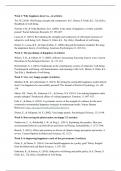Week 1: Why happiness deserves... (4 articles)
Tov, W. (2018). Well-being concepts and components. In E. Diener, S. Oishi, & L. Tay (Eds.),
Handbook of well-being.
Norrish, J.M., & Vella-Brodrick, D.A. (2008). Is the study of happiness a worthy scientific
pursuit? Social Indicators Research, 87, 393-407.
Lucas, R. E. (2018). Reevaluating the strengths and weaknesses of self-report measures of
subjective well-being. In E. Diener, S. Oishi, & L. Tay (Eds.), Handbook of well-being.
Diener, E., Lucas, R.E., & Napa Scollon, C. (2006). Beyond the hedonic treadmill: Revising
the adaptation theory of well-being. American Psychologist, 61, 305-314.
Week 2: The psychology of happiness (2 articles)
Wilson, T. D., & Gilbert, D. T. (2005). Affective forecasting: Knowing what to want. Current
Directions in Psychological Science, 14, 131-134.
Heintzelman, S. J. (2018). Eudaimonia in the contemporary science of subjective well-being:
Psychological well-being, self-determination, and meaning in life. In E. Diener, S. Oishi, & L.
Tay (Eds.), Handbook of well-being.
Week 3: Very very happy people (4 articles)
Sheldon, K.M., & Lyubomirsky, S. (2019). Revisiting the sustainable happiness model and pie
chart: Can happiness be successfully pursued? The Journal of Positive Psychology, 16, 145-
154.
Mauss, I.B., Tamir, M., Anderson, C.L., & Savino, N.S. (2011). Can seeking happiness make
people unhappy? Paradoxical effects of valuing happiness. Emotion, 11, 807–815.
Folk, C., & Dune, E. (2023). A systematic review of the strength of evidence for the most
commonly recommended happiness strategies in mainstream media. Nature Human
Behaviour. https://doi.org/10.1038/s41562-023-01651-4
Diener, E., & Seligman, M. E. (2002). Very happy people. Psychological Science, 13, 81-84.
Week 4: Does saving the planet make you happy? (2 articles)
Venhoeven, L. A., Bolderdijk, J. W., & Steg, L. (2013). Explaining the paradox: How pro-
environmental behavior can both thwart and foster well-being. Sustainability, 5, 1372-1386.
Brosch, T. (2021). Affect and emotions as drivers of climate change perception and action: A
review. Current Opinion in Behavioral Sciences, 42, 15-21.
Week 5: Is improving happiness a task of the government (3 articles)
Oishi, S., & Diener, E. (2014). Can and should happiness be a policy goal? Policy Insights
from the Behavioral and Brain Sciences, 1, 195–203.
Odermatt, R., & Stutzer, A. (2018). Subjective well-being and public policy. In E. Diener, S.
Oishi, & L. Tay (Eds.), Handbook of well-being.
,Flavin, P., Pacek, A.C., & Radcliff, B. (2014). Assessing the impact of the size and scope of
government on human well-being. Social Forces, 92, 1241-1258.
Week 6: The philosophy of happiness (3 articles)
Wareham, C.S. (2022). Age and well-being: Ethical implications of the U-curve of happiness.
In C.S. Wareham (Ed.), The Cambridge Handbook of the Ethics of Ageing, (pp. 243-256).
Cambridge University Press.
Steptoe, A., Deaton, A., & Stone, A.S. (2015). Subjective well-being, health, and ageing. The
Lancet, 385, 640-648.
Kesebir, P. (2018). Scientific answers to the timeless philosophical question of happiness. In
E. Diener, S. Oishi, & L. Tay (Eds.), Handbook of well-being.
Week 7: Me, myself and I (2 articles)
Gable, S. L., & Bromberg, C. (2018). Healthy social bonds: A necessary condition for
well-being. In E. Diener, S. Oishi, & L. Tay (Eds.), Handbook of well-being.
Kim, M. J., & Sul, S. (2023). On the relationship between the social brain, social
connectedness, and wellbeing. Frontiers in Psychiatry, 14, 1112438.
Week 8: Can money buy happiness?
Easterlin, R.A., Angelescu McVey, L., Switek, M., Sawangfa, O, & Smith Zweig, J. (2010).
The happiness–income paradox revisited. PNAS, 107(12), 22463- 22468.
Tay, L., Zyphur, M., & Batz, C. L. (2018). Income and subjective well-being: Review,
synthesis, and future research. In E. Diener, S. Oishi, & L. Tay (Eds.), Handbook of well-
being.
Missing:
Artikel: Odermatt, R., & Stutzer, A. (2018). Subjective well-being and public policy. In
E. Diener, S. Oishi, & L. Tay (Eds.), Handbook of well-being.
Artikel: Steptoe, A., Deaton, A., & Stone, A.S. (2015). Subjective well-being, health, and
ageing. The Lancet, 385, 640-648.
Artikel: Wareham, C.S. (2022). Age and well-being: Ethical implications of the U-curve of
happiness. In C.S. Wareham (Ed.), The Cambridge Handbook of the Ethics of Ageing, (pp.
243-256). Cambridge University Press.
Week 1 – The psychology of happiness
, Artikel: Diener, E., Lucas, R.E., & Napa Scollon, C. (2006). Beyond the hedonic treadmill:
Revising the adaptation theory of well-being. American Psychologist, 61, 305-314.
The text discusses revisions to the hedonic treadmill model of well-being, highlighting five
important points:
1. Nonneutral Set Points:
Individuals' happiness set points are not hedonically neutral.
Most people are generally happy, and if they adapt, it tends to be towards a
positive baseline.
2. Individual Set Points:
People have different happiness set points, influenced by inborn, personality-
based factors.
Individual differences predispose individuals to experience varying levels of
well-being.
3. Multiple Set Points:
Happiness comprises separable well-being variables (e.g., pleasant emotions,
unpleasant emotions, life satisfaction).
These variables may move in different directions over time, challenging the
idea of a single unitary set point.
4. Happiness Can Change:
Well-being set points can change under certain conditions.
Long-term levels of happiness can be influenced by stable external
circumstances that vary across nations.
5. Individual Differences in Adaptation:
Individuals differ in their adaptation to events; some may change their set
point, while others may not.
In longitudinal studies, the size and direction of change in life satisfaction vary
considerably across individuals.
Implications:
Adaptation processes explain why many factors have only small influences on
happiness.
More flexible processes are likely involved, varying across events, individuals, or
even within the same individual over time.
Important Concepts for Exam:




